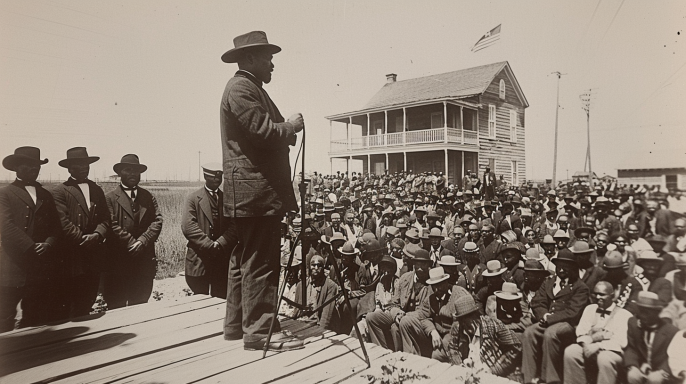Introduction
On this day in 1865, Union General Gordon Granger arrived in Galveston, Texas, and announced the enforcement of the Emancipation Proclamation, effectively freeing the last enslaved African Americans in the Confederacy. This day is celebrated as Juneteenth, commemorating the end of slavery in the United States and marking a significant moment in American history.
Historical Background
The Emancipation Proclamation, issued by President Abraham Lincoln on January 1, 1863, declared that all enslaved people in Confederate states were to be set free. However, enforcement of the proclamation was limited to areas under Union control, leaving many enslaved people in the Confederacy unaware of their freedom until Union forces could secure these territories.
The Events of June 19, 1865
On June 19, 1865, Union General Gordon Granger arrived in Galveston, Texas, to enforce the Emancipation Proclamation. He issued General Order No. 3, announcing that all enslaved people were free and emphasizing absolute equality of personal rights and rights of property between former masters and slaves. This moment marked the end of slavery in the United States.
Immediate Reactions and Consequences
The reactions to General Granger’s announcement were mixed. For the newly freed African Americans, the news brought immense joy and hope, leading to spontaneous celebrations. However, for many former slaveholders, the announcement was met with resistance and anger. The social and economic impacts were profound, leading to significant changes in the lives of both freed people and the broader society in Texas.
The Emancipation Proclamation
The Emancipation Proclamation was a landmark document in American history. It declared the freedom of all enslaved people in Confederate states but had limitations, as it did not apply to border states or areas under Union control. Despite its limitations, it was a crucial step towards the abolition of slavery and the eventual passage of the 13th Amendment.
The Road to Freedom
The journey towards freedom for African Americans was long and fraught with challenges. The enforcement of the Emancipation Proclamation on June 19, 1865, was a significant milestone, but it was only the beginning. African Americans continued to face systemic racism, segregation, and discrimination, leading to the ongoing fight for civil rights and equality.
Juneteenth Celebrations
Early Juneteenth celebrations included prayer services, barbecues, music, and cultural performances. These gatherings provided an opportunity for African Americans to come together, reflect on their past, and celebrate their freedom. Over time, the holiday evolved, with various traditions emerging across different communities.
Juneteenth and Civil Rights
Juneteenth is deeply connected to the Civil Rights Movement. Leaders like Martin Luther King Jr. and others recognized its significance and used it as a platform to advocate for equality and justice. The holiday became a symbol of the ongoing struggle for civil rights and the pursuit of a more just society.
Recognition of Juneteenth
The push for national recognition of Juneteenth gained momentum over the years. Many states officially recognized the holiday, and in June 2021, Juneteenth was declared a federal holiday, solidifying its importance in American history and culture.
Juneteenth in the 21st Century
Modern Juneteenth celebrations are vibrant and diverse, reflecting the holiday’s rich history and cultural significance. Parades, festivals, educational events, and community gatherings are held across the country, emphasizing the importance of remembering the past and working towards a better future.
Educational Importance
Teaching Juneteenth in schools is crucial for preserving its history and significance. Education plays a vital role in ensuring that future generations understand the struggles and triumphs of African Americans and the broader context of the fight for freedom and equality.
Cultural Significance
Juneteenth holds a special place in African American culture. It has inspired music, art, literature, and other forms of cultural expression, serving as a source of pride and identity for the African American community.
Global Perspective
Juneteenth is not only significant in the United States but also has a global resonance. It is compared to other emancipation celebrations worldwide, highlighting the universal importance of freedom and human rights.
Juneteenth and Modern Activism
Juneteenth has become a focal point for contemporary social justice movements. It serves as a reminder of the ongoing struggle for equality and justice, inspiring activism and advocacy for the rights of African Americans and other marginalized communities.
The Future of Juneteenth
As Juneteenth continues to be celebrated and recognized, its future holds the potential for even greater significance. Future generations can honor the holiday by promoting education, unity, and continued efforts towards achieving true equality and justice.
Conclusion
Juneteenth is a day of profound historical significance, marking the end of slavery in the United States and celebrating the enduring spirit of freedom. As we reflect on its history and legacy, we are reminded of the importance of remembering the past and working towards a more just and equitable future.
FAQs
What is Juneteenth?
Juneteenth is a holiday commemorating the end of slavery in the United States, observed on June 19th.
Why is Juneteenth celebrated?
Juneteenth is celebrated to honor the day Union General Gordon Granger announced the enforcement of the Emancipation Proclamation in Galveston, Texas, freeing the last enslaved African Americans in the Confederacy.
How is Juneteenth observed today?
Today, Juneteenth is observed with parades, festivals, educational events, and community gatherings that celebrate African American culture and history.
What was the Emancipation Proclamation?
The Emancipation Proclamation, issued by President Abraham Lincoln on January 1, 1863, declared that all enslaved people in Confederate states were to be set free.
How did Juneteenth become a national holiday?
Juneteenth became a national holiday in June 2021, when President Joe Biden signed legislation recognizing it as a federal holiday, following years of advocacy and recognition at the state level.

